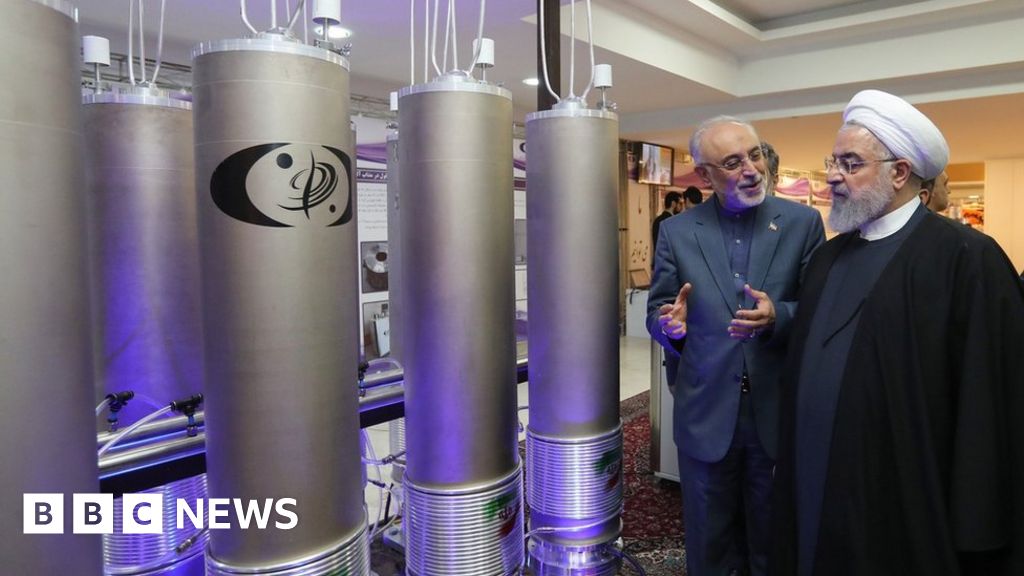
Iran has exceeded the amount of enriched uranium that it was allowed to have under a 2015 nuclear deal with world powers, sources say.
Under the accord, Iran agreed to limit its sensitive nuclear activities and allow in international inspectors in return for the lifting of crippling economic sanctions.
What is enriched uranium?
Enriched uranium is widely used for peaceful purposes, such as medical research and producing electricity. But if it is highly purified it can also be used to make a nuclear bomb.
Under the nuclear deal, Iran is only permitted (until 2031) to produce low-enriched uranium, which has a 3-4% concentration of the most fissile isotope, U-235, and can fuel a power plant. "Weapons-grade" uranium is 90% enriched or more.
Iran can also stockpile no more than 300kg (660lbs) of the low-enriched uranium and operate no more than 5,060 of the centrifuges used to separate out U-235 isotopes from uranium hexafluoride gas.
Another part of the deal instructs Iran not to accumulate more than 130 tonnes of heavy water, which contains more hydrogen than ordinary water, and to redesign its heavy-water nuclear facility at Arak. Spent fuel from a heavy-water reactor contains plutonium, which can be used in a nuclear bomb.
Why did Iran break the limit?
The Iranian economy has slumped since President Donald Trump withdrew from the nuclear deal in May 2018 and began reinstating sanctions. He said the deal was flawed and that he wanted to force Iran's government to renegotiate the terms - something it refused to do.
The other parties to the deal - the UK, France, Germany, China and Russia - criticised Mr Trump's decision and said they remained committed to the deal.
In May 2019, the White House stepped up pressure on Iran by ending exemptions from secondary sanctions for countries still buying Iranian oil.
It also ended exemptions for countries participating in deals under which Iran exchanged its surplus low-enriched uranium for un-enriched ore concentrate known as "yellowcake" and sold its surplus heavy water. Such transfers allowed Iran to continue production of both materials without exceeding the stockpile limits.
Iran's President, Hassan Rouhani, subsequently said it would retaliate against the US sanctions by suspending its commitment to comply with the stockpile caps. Officials noted that Iran stated in the nuclear deal that it would cease performing its commitments "in whole or in part" if sanctions were reimposed.
Mr Rouhani also gave the five remaining parties to the deal until 7 July to shield Iran from the sanctions' effects. If they failed, he said, Iran might start enriching uranium beyond 3.67% concentration and halt the redesign of the Arak reactor.
The European countries have set up a bartering mechanism that would essentially allow foreign companies to trade with Iran in a way that would avoid sanctions, but it is not yet operational.
Why does this matter?
First and foremost, it could be considered a violation of the nuclear deal.
If that is formally confirmed by the International Atomic Energy Agency (IAEA), whose inspectors monitor compliance, the deal allows for a so-called "snap back" of UN and multilateral sanctions on Iran. No permanent member of the UN Security Council would be able to veto the move.
Iran has also said it will speed up production of low-enriched uranium once it has breached the stockpile limit, but its concentration would still be well below anything that could be used possibly for a weapon.
Experts say they would be more concerned if Iran decided after 7 July to violate another commitment and started to enrich uranium beyond 3.67%.
The Atomic Energy Organisation of Iran said earlier this month that it might begin to enrich uranium up to 5% so that it could provide fuel for its nuclear power plant at Bushehr, or even up to the 20% required for Tehran's research reactor.
The production of 20% enriched uranium is a major concern because it is most of the way to weapons-grade uranium. Going from uranium's natural state of 0.7% concentration to 20% takes approximately 90% of the total effort required to reach weapons-grade.
Before the nuclear deal was implemented, Iran had a sufficient amount of 20% enriched uranium and number of centrifuges that its so-called "break-out time" - the time it would theoretically take to acquire enough fissile material for one nuclear weapon, if it chose to do so - was estimated to be about two to three months.
The deal slowed the break-out time to at least a year. But any reversal of Iran's commitments on uranium enrichment would see that start to shorten.
Does Iran want a nuclear bomb?
Iran insists it has never sought to develop such a weapon.
The international community does not believe that, pointing to evidence collected by the IAEA suggesting that until 2003 Iran conducted "a range of activities relevant to the development of a nuclear explosive device". Some of those activities continued until 2009, according to the IAEA.
Last year, Israel displayed what it said were archives it secretly took from Iran which showed Iran continued to pursue nuclear weapons knowledge after 2015 - though Iran called the accusation "ridiculous".
In January, the US intelligence community nevertheless assessed that Iran was "not currently undertaking the key nuclear weapons-development activities we judge necessary to produce a nuclear device".
What have world powers said?
Earlier this month, the US accused Iran of resorting to "nuclear blackmail" that it said should be "met with increased international pressure".
German Chancellor Angela Merkel has warned that if Iran does not abide by its commitments "that will of course have consequences".
https://www.bbc.com/news/world-middle-east-48776695
2019-07-01 10:59:26Z
52780324222554
Tidak ada komentar:
Posting Komentar